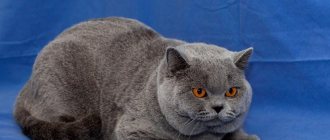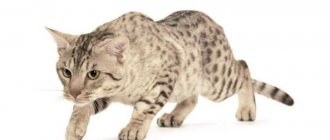You can’t describe the character of a British cat in a few words. It’s the same as saying about Napoleon’s life “he led France.” Only, the British are not French. They are proud, sometimes arrogant. We are talking about cats, about them - cats of the British breed.
Only this fact does not mean that representatives of the breed never want to be petted. They want it, but when they need it, and not at the moment when the owner takes it into his head. This cat is a personality. He has an opinion that must be taken into account. To understand what kind of character British cats have, you need to watch them a little, or better yet, live in the same house for several weeks.
Features of behavior and character of British women
When characterizing British cats, you need to understand that everything depends on their behavior. If you want to raise an animal, then you need to do this only up to a year, after which you won’t be able to change anything. Some owners complain about disobedience, not realizing that this is a consequence of poor upbringing . The British are proud enough that they will never ask a person for help. These are not the breeds that will cuddle or purr plaintively, trying to attract attention. These representatives will try to act independently.
While still babies, British kittens easily learn to use the litter box. The aristocratic breed does not allow them to shit wherever they have to. If you look at how a cat sleeps, you can involuntarily smile: on its back, in a ball, with its hind legs outstretched, on its side. The places to sleep are no less fun. Sometimes fluffy hides in places where you wouldn’t even think of looking for him - in a laundry basket or among soft toys. The habits of the British dog are often unpredictable, but this is dictated by the breed and some inherent instincts.
Training and education
The description of habits and general characteristics of the breed lead to the fact that the short-haired British girl and boy have well-developed intelligence and mental abilities. Therefore, cats are easy to train, quickly learn new knowledge, and follow commands. However, if the kitten is a mixture of a British cat and a regular cat, perhaps such skills will not be inherent in it.
It is important to pay attention to raising your pet. If a Briton is at fault, punishment should be applied immediately. Under no circumstances should an animal be beaten, humiliated, or restrict its freedom. By the stern tone and corresponding behavior of the owner, a smart cat will immediately understand what her fault is. However, do not forget about praise. Like any loyal, loving animal, the British cat will gladly do something for which she will be praised from the bottom of her heart.
In order for a cat to grow up well-mannered and cultured, it is important to adhere to certain requirements. If the owner forbids doing or touching something, it is important not to allow the animal to repeat it again. Otherwise, the British will not understand what is allowed and what is prohibited. The cat must clearly understand who is boss in the house. Then he will treat the rules with respect and understanding and try to strictly observe them.
Character of British cats
Multifaceted and contradictory - this is how the character of “aristocratic animals” can be briefly described. Representatives of the British differ significantly in disposition from other cat breeds.
They never:
- They won’t sit in the kitchen and yell for food to be poured into them.
- They will not ask to be held by their owner, and will not sit on their laps if you take them by force.
- They won’t rub against their owner for days.
Cats spend all their free time to their advantage and do what they want. The British are independent and proud.
Cleanliness
Cleanliness is something that cannot be taken away from British women . This is inherent in them, this is what their mother cat teaches them. Purrs can lick themselves for hours without getting tired, and until the procedure is completely completed, they will not switch to another activity.
Representatives of this breed will not allow themselves to tear up furniture if they have a nail clipper for this purpose. Having shown the animal a couple of times the place reserved for sharpening nails, they will remember it forever.
Mind
The British are not short on intelligence. Tangles understand everything almost the first time. The only task that lies with the owner is to initially show the animal where to go to the toilet, where is the place to eat, where is the lounger, and the like.
Amenability
The British Shorthair cat gets along well with any animal, be it dogs, cats, parrots, iguanas and other representatives of the “wild world”. If a Briton doesn’t like something, he will not tolerate the disgrace that is happening next to him, but will turn around and proudly leave.
The same applies to children: when kids don’t touch cats, they don’t pay attention to them. Otherwise, the felines get up and go home.
Stubbornness and touchiness
All cats are stubborn in their own way, and the same applies to the British. Speaking about the character of British cats, it would not be out of place to say that they do everything according to their own wishes and at their own discretion. If a furry friend doesn’t want to lick him out of his house to play in the cold season, for example, then you can’t force him to do it. Of course, you can shake the animal out by force, but it will immediately find a place where no one will disturb it.
As for touchiness, pets have plenty of this. If the owner scolded the four-legged animal undeservedly or suddenly raised his hand to it, one should expect trouble. The cat will not forgive this, so it will sit in the shelter for a long time, and then refuse to eat.
Important! To avoid having to scold an adult cat for the slightest misdeeds, kittens should be taught order from childhood, instilling in them certain skills.
Restraint
The character of British cats is such that they do not like to show tenderness, love or resentment towards people, and especially in front of strangers. When an animal is offended, it will lick itself for a long time, thus relieving stress. A joyful bundle can make a circle of honor around a person, and then climb into its house or go to another favorite place. Only some representatives of the British can be gentle and loving, but this is due to the merit of the person who taught the animal to do this from childhood.
Playfulness
A cat's life consists of more than just sleep and food. Games play a big role for felines. The British are big fans of fooling around, of course, within the limits of what is permitted. An exception may be adult cats, although they can sometimes be caught doing this.
Kittens are overly selective in their games. What they like most is hiding and emerging from their ambush. Attacking is another fun activity for them. In this way, they try to imitate adult representatives who, in a playful way, teach their children to attack and also defend themselves. Sometimes, when kittens are tired, they pretend to sleep so that they can be left for a while. And after a short period of time, they pick up, raising their tail, and begin to chase their prey again.
Animals associate some toys with real prey - mice or rats. Swinging objects may remind four-legged birds of birds or butterflies that they so want to catch. At the same time, animals understand perfectly well that when playing, they are not hunting anyone, so they behave somewhat differently. When tracking real prey, the pets are serious and attentive, sometimes the cats are angry, but you can’t do without this when hunting. At home, they rarely release their claws, and their bites do not hurt at all.
Knowing the character of the British, many breeders recommend that owners set up a small corner for their pets, throwing small toys and strings there. If a person does not have time to play with his four-legged pet, then he needs to be given the opportunity to occupy himself independently.
Important! Cats who are not given time and who do not have toys begin to play mischief: jumping on furniture, hanging on curtains, knocking down everything in their path. And this is not the fault of the animals, but of the people who did not provide their pets with everything they needed.
Attitude towards other animals
If you already have an animal in the house and you decide to get a British one, then it is very difficult to guess how the relationship will develop. Representatives of this breed have a rather capricious character, everything is very individual.
There are no particular problems with other pets. Relationships can be very good if a British kitten and another cat or dog are taken into the house at the same time. They are still getting used to each other as babies.
Material on the topic: what is the British cat breed.
In the case when an adult is taken into the house, everything depends on how the other animal will treat the representative of the British breed. They really don't like being bothered. It doesn’t matter what kind of pet is next to them in the same apartment. The main thing to maintain calm is to simply not bully or touch them.
Britons usually get along easily with other animals.
Psychology of British cats
The character and behavior of a British cat can be very different. However, the key determining factor is the animal's mood. The owner himself can spoil it or, on the contrary, improve it. Despite the fact that the pet is self-sufficient and can be alone for a long time, it cannot be ignored.
Some owners of four-legged animals complain that with the appearance of a child or another animal in the family, the British change, become closed and touchy. This happens because no one pays attention to the furry friend; they found a replacement for him. The British actually become very attached to their owners, but only because of their disposition do they not show it. However, this does not mean that animals can live on their own; they also want to be handled and noticed.
What to feed a Briton
An adult cat needs to be fed at least twice a day, and a kitten at least four times. Your pet should have a balanced diet rich in vitamins. A cat's diet can be represented by:
- natural food:
- boiled meat without bones and skin;
- liver;
- eggs;
- porridge;
- fish;
- vegetables;
- dairy products.
- ready-made food.
When choosing food, you should pay attention to the line of professional food intended for the British breed.
The British are friendly, moderately affectionate, and treat all family members evenly. And yet, a British cat should not be owned by families with small children who are eager to cuddle the animal. This breed will not allow itself to be made into a toy; accordingly, it will hide in corners and turn into a frightened animal. If you take into account the wayward character of the cat, then she will repay you with affection.
Habits
The bright character traits of the British directly influence their habits. Some people believe that since animals belonging to the presented breed are quite obedient, then they cannot do any bad things, but this is not so.
Common negative habits include:
- Scratching and biting hands.
- Throwing objects off surfaces.
To somehow compensate for this, many people want to know how the British are doing with catching mice, and this is a completely different matter.
Catching mice
British cats are often called clumsy. It is impossible to argue with this, but this does not prevent them from being excellent rat-catchers and mouse-catchers. If you believe history, the French always took cats of these breeds with them on voyages so that they would keep an eye on supplies and leave no chance for rodents to profit from various delicacies.
It is rare to find mice in modern apartments, so even with a strong desire, it would be difficult for cats to try to hunt someone. Another thing is animals that live in private sectors and in dachas. Pet owners have repeatedly noted that cats are very agile and excellent hunters. Some people believe that since they managed to cope with the rodent, they should definitely feast on it, but this is not so. Representatives of felines catch mice and rats for fun, they do not even understand that this is food that should be eaten. The reason lies in the character of the British cat, which was taught from childhood to a place for food. Having played enough, the animal leaves its prey and goes on about its business.
Biting and scratching
Scratching and biting the hands of their owners is a favorite activity of four-legged animals. At the age of three or four months, the kitten begins to bite the hands and sometimes the legs of a person. This is directly related to the change of teeth in animals. There is no need to think that such a habit will go away on its own. If the situation continues for a month, the animal will realize that it is possible to do this and in the future you will not wean it from it. At the same time, there is no need to try to beat the baby or shout at him; it is not his fault that his teeth itch. It needs to be done much simpler - during an attack, put a soft toy or mouse on your hand, which will interest the pet and become its favorite victim in the future.
Dropping items
Throwing objects off the table is an equally interesting activity. It can be anything, from a pen to a flower pot. Among the main character traits, self-indulgence is not listed among the British, but for them it is not self-indulgence, but curiosity. Cats are very interested to see how the object will fly down and what will happen to it after. If you want to stop this, then you should either sprinkle the surface with a pungent odor that animals cannot tolerate, or make the surface so that the pet does not have the slightest chance of climbing on it. At the same time, you must not forget about toys for your pet so that he does not have to get bored.
Origin of the shorthaired breed
As you might guess, the British straight-eared cat first became known on British territory. Those interested in it often have questions about the age of the breed. The fact is that no one had previously been particularly involved in describing the origin of breeds. Stud book records arose much later. To illustrate this statement, it is enough to say that the breed received a standard and pedigree only at the very end of the century before last, namely in 1898.
However, there is some information about when to start counting the breed. Researchers suggest, and not without reason, that the age of this wonderful breed is similar to the age of the Roman Empire! Where did such information about the origin come from if there were no stud books? It's time to turn to ancient images of that period. On them you can see cats that are strikingly similar to modern representatives of the British breed.
IMPORTANT: By the way, initially this cat was short-haired.
It is possible that it was precisely this short, tightly knit coat that the breed reached such an impressive age. The cat was given the opportunity to survive in any conditions. In addition, the cover helped the ancient representatives of the breed to always look quite representative. The gray color of the plush fur is exactly the universal color that most owners like.
In addition to the color and texture of the coat, the breed attracted such characteristics as endurance and enviable physical strength. The British cat is developed, has a massive back and shoulders. Quite muscular legs can also be considered a feature. As a result, the weight of representatives of the breed is rather large - from 5 to 8 kg with a height of 9-14 cm. What is unique is that with such height and weight, the breed managed to look quite harmonious and move gracefully.
It is quite natural that such a hardy, physically developed cat found a place among Roman sailors. They gladly took animals with them - this is how it was around the 2nd century BC. The breed appeared on British lands. Graceful animals with a mysterious gray color immediately fell in love with local residents. This color is also called blue. Even today it is very popular, and many centuries ago, according to surviving information, it was the only option.
In many ways, the age of the short-haired breed is so impressive because its representatives brought by the Romans crossed not only with each other, but also with wild cats. Given the isolation of the area, the breed concentrated on the islands, acquiring resistance to the legendary British rainy and windy climate. Which, of course, is a huge advantage when kept in our latitudes.
About activity
The character of British kittens, like cats, can actually be reserved and sometimes even cold, but this does not in any way affect their activity. The British sleep a lot, but in their free time they will do what they want: run, jump, play. The exception in this case is only older representatives of the breed. Pets that have access to the street are more active. They are interested in everything around them: leaves, butterflies, flowers, so cats can spend hours on end outside. If there are several cats in the family, then additional activity will be provided. This is very good, since active animals have much fewer health problems.
Important! To prevent your cat from lying around in the apartment, you should play with him from time to time and offer him some options for useful ways to spend his waking hours.
Will it catch mice?
Following from history, British cats were specially bred to catch rats and mice. For successful hunting, breeders wanted to achieve a thick and short coat, so that it would be difficult for rodents to bite and injure the little catcher.
All representatives of this breed catch mice. This is genetically embedded in them. But in city apartments, as a rule, there is no opportunity to hunt at all.
Some owners take their British Shorthair cat with them to the countryside. There they catch all the mice in the area within a week. They most often bring their prey to the owner. When the rodents run out, the hunt begins for frogs, large insects, and birds. Cats are more graceful and passionate in hunting than cats.
The British are born mousecatchers.
Do the British have bad habits?
It is believed that aristocrats do not and cannot have bad habits. Of course, the behavior of British cats may sometimes not fit into the generally accepted framework of these peculiar animals, but in any case, representatives of other breeds should be compared to them. This is not entirely true.
There are several bad habits of British cats that you should be aware of:
- Using the owner's personal belongings as toys, as well as items that cannot be used for these purposes. We can talk about jewelry, tubes of creams, sweets. If there is no fear that the animal will take these items somewhere, then you should not take them from him. The kitten will frolic a little and will lose all interest in what was just found. Otherwise, it is better to pick up the item, but be sure to exchange it for any other one.
- Some animals love to climb inside bags, boxes, packages and cabinets. It is difficult to find an explanation for this, but this does not mean that the pet will immediately stop doing this. In this case, you can also do it in two ways - allow it to be done or try to wean it off by replacing one activity with another.
Britons may actually be skittish animals, but they are also very intelligent, playful and active pets.
Did you like the article?
Bad habits
Like any other cats, cats of the British breed have their own bad habits and habits.
Cats love to drop objects. In such a situation, you need to immediately prohibit your four-legged friend from behaving this way. Try treating the surface with something. Rest assured that after the first punishment the Briton will realize his mistake.
Sometimes kittens may start scratching and biting. In adult cats, this habit usually disappears. If it remains, you should buy various pet toys at the pet store with which the kitten can have fun and thereby get rid of the habit.
Some cats love to inspect the contents of many people's bags and packages. They are unlikely to harm things, so you shouldn’t stop this habit.











